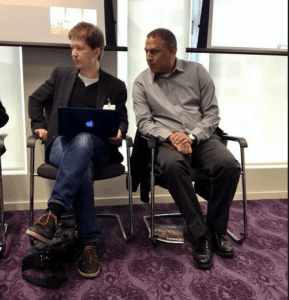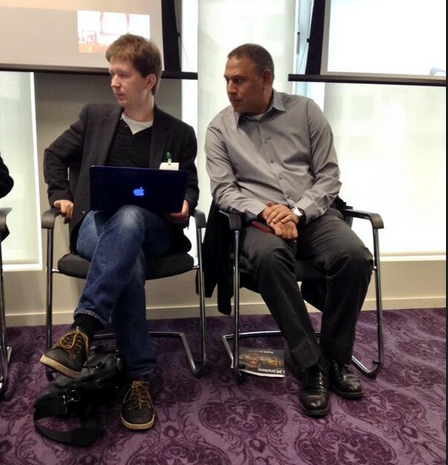
@AndreiSoldatov and @cyberrights at the @IndexCensorship Brussels event on Press Freedom in Russia Turkey Azerbaijan. Photo: Ricardo Gutiérrez
On Thursday, Index hosted a discussion with five leading media experts from Turkey, Russia, and Azerbaijan. As journalists, bloggers, entrepreneurs and campaigners, they experience first-hand how censorship – online and off – is being ramped up in their countries, and they argue that their stories are still not being sufficiently heard.
Turkey’s Yaman Akdeniz and Amberin Zaman, Russia’s Andrei Soldatov and Anton Nossik, and Azeri blogger Arzu Geybulla shared shocking stories about journalists harassed in government-led smear campaigns, the arrests on spurious criminal charges of those who speak openly on social media, and the growing role of governments in blocking free expression online.
“The internet is becoming less and less independent of government interference,” Nossik told the Brussels audience.
Index works with writers – including authors, journalists and bloggers – and artists globally to help them tell a wider world about the threats they face. We are a platform that allows individuals to speak for themselves, and fights for those who cannot.
In the first article from one of our event speakers, Andrei Soldatov assesses the state of online freedom in Russia:
Since November 2012, we’ve been living in a country with the internet censored extensively by a nationwide system of filtering.
This system has been constantly updated ever since. Now we have four official blacklists of banned websites and pages: the first one is to deal with sites deemed extremist; the second is about sites blocked because of child pornography, suicide and drugs; the third consists of sites with copyright problems; the fourth, the most recent one, was created in February and lists the sites blocked without a court order because they call for non-sanctioned protests. There is also an unofficial fifth blacklist aimed not at sites but at hosting companies, based abroad, which have proven themselves not very cooperative with Russian authorities.
Technically, the internet filtering system in Russia is not very sophisticated. Thousands of sites were blocked by mistake, while if you want to access a blocked site you can do that using circumvention tools or even very basic things like Google translate.
At the same time very few people were sent to jail for posting critical things online, and relatively few new media were put under direct government pressure.
But surprisingly, freedom of expression on the internet in Russia has been hugely affected: users have become cautious in their comments, and internet companies, the largest in the country, even when invited to talk to Putin, are so frightened that they failed to raise the issue of regulation at the meeting.
The beauty of the Russian approach is that it doesn’t need to be technically sophisticated to be efficient. It also doesn’t need mass repression against journalists or activists.
So why is that?
Basically, the Russian approach is all about instigating self-censorship. To do this, you need to draft the legislation as broad as possible, to have the restrictions constantly expanded — like the recent law which requires bloggers with more than 3.000 followers to be registered — and companies, internet service providers, NGOs and media will rush to you to be consulted and told what’s allowed. You should also show that you don’t hesitate to block entire services like YouTube – and companies will come to you suggesting technical solutions, as happened with DPI (deep packet inspection). It helps the government to shift the task of developing a technical solution to business, as well as costs.
You also need to encourage pro-government activists to attack the most vocal critics, to launch websites with list of so-called national traitors, and then to have Vladimir Putin himself to use this very term in a speech.
All that sends a very strong message. And as a result, journalists will be fired for critical reporting from Ukraine by media owners, not by the government; the largest internet companies will seek private meetings with Putin, and users of social networks will become more cautious in their comments.
We have seen this before – the very same approach was used against traditional media in the 2000s. What made the situation on the internet special is that the government found a way to shift the task of providing a technical solution for censorship to companies, including the global ones, and make the companies pay for the system. The way global platforms seem to respond to that is not very impressive. Localisation cannot be a solution because it helps to localise the problems of censorship. Now the Russian search engine Yandex presents two different maps of Ukraine, with and without Crimea, for the Ukrainian and Russian audiences respectively.
The biggest problem with this approach is that it provokes governments to put more pressure on global platforms. One day Twitter was heavily criticised by a Russian official in a pro-Kremlin paper who threatened to block the platform completely. The next day Twitter rushed to block an account of Pravy Sector, one of the most-anti Russian political parties in Ukraine, and blocked it for Russian users.
This article was published on June 20, 2014 at indexoncensorship.org





